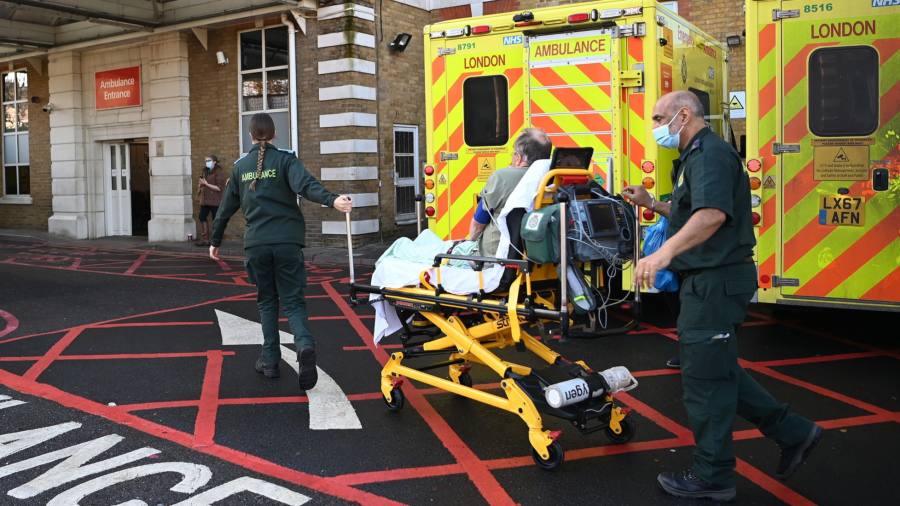NHS sufferers are struggling “appalling” ready occasions with some UK accident and emergency departments in a “full state of disaster”, a number one well being official warned on Monday, as the federal government stated decreasing strain on the service was its “prime precedence”.
Dr Ian Higginson, vice-president of the Royal Faculty of Emergency Drugs, which screens requirements in A&E departments, advised BBC Radio 4’s At this time Programme, that some individuals had been ready days earlier than being handled.
“The waits being skilled by sufferers at the moment are appalling, so we’re listening to of sufferers who’re in our emergency departments ready to be admitted now for as much as 4 days and it was 4 hours,” he stated.
Talking in a while BBC Radio 5 Dwell, Higginson added that some emergency departments had been in a “full state of disaster” warning that docs had been now “unable to offer care at the usual” they want.
His feedback echoed warnings by different well being officers over the weekend concerning the dire state of the well being service as a mix of rising Covid and flu instances, pandemic backlogs and workers vacancies intensified strain on an already strained NHS.
Dr Adrian Boyle, president of the RCEM, stated that A&E ready occasions this winter had been “a lot worse than in earlier years”. He estimated that between 300 and 500 individuals had been dying “as a consequence of delays and issues with pressing and emergency care every week”.
Saffron Cordery, interim chief government of NHS Suppliers, warned that the well being service was now going through “equal ranges of strain” seen through the pandemic. In the meantime, Dr Tim Cooksley, president of the Society for Acute Drugs, an organisation which represents workers working in acute drugs, known as on the federal government to “declare a nationwide NHS main incident”.
In keeping with official steering, 95 per cent of ambulance handovers ought to happen inside half-hour of a affected person arriving at hospital. However figures from NHS England printed final month revealed that about one-third of sufferers in England had been pressured to attend greater than half-hour.
The pressures on the well being service come forward of a contemporary wave of strikes by nurses, paramedics and ambulance drivers.
Members of the Royal Faculty of Nursing, who walked out for the primary time of their historical past in December and are demanding a 19 per cent pay rise, will stage additional industrial motion on January 18 and 19. Unison has confirmed that ambulance employees at 5 NHS trusts in England will strike on January 11 and January 23.
Prime minister Rishi Sunak stated in his New Yr’s message that the federal government had “taken decisive motion” to assist the NHS by growing funding and recruitment.
“I’m completely clear that the prime minister treats this as a prime precedence,” training minister Robert Halfon advised the BBC. “We’re growing the NHS capability by the equal of seven,000 beds, spending an additional £500mn to hurry up hospital discharge and enhance capability. There may be an additional £150mn for the ambulance service.”
The well being division added in an announcement: “We recognise the pressures the NHS is going through following the impression of the pandemic and are working tirelessly to guarantee individuals get the care they want, backed by as much as £14.1bn extra funding for well being and social care over the subsequent two years.”

